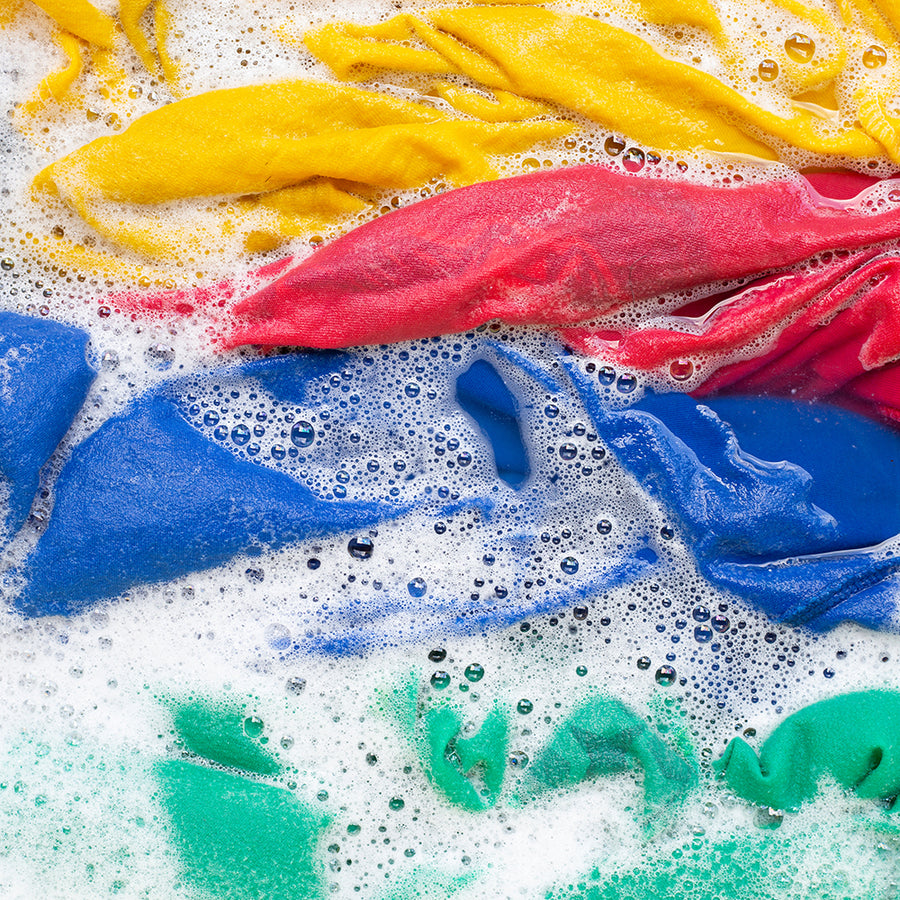Your cart is empty.
Let's change that. Start Shopping
Let's change that. Start Shopping
Apr 30, 2021

Many people know that soap can cause allergic reactions. These reactions are usually caused by chemicals in the soap or skin irritants, such as fragrances and dyes. But did you know that some people have allergies to laundry detergent? Although people commonly refer to these skin allergies as "soap allergy," skin reactions are usually more common with detergents than soaps. Most laundry detergents contain artificial dyes and perfumes that can irritate the skin, especially if you have sensitive skin or are prone to allergies. So, let’s break down how to prevent soap allergies from occurring due to laundry detergent, and how to treat it should you become exposed.
Soap allergy is a skin condition that causes the body to produce an allergic reaction when coming into contact with soap. Many of the ingredients found in detergents, like surfactants, can act as an allergen, especially if they are not of high quality.
Soap allergies also arise from the harsh chemicals in soap that your skin absorbs and reacts to. The reaction usually occurs quickly but may vary depending on sensitivity level or ingredient concentration.
Oftentimes when washing clothes, laundry detergent may leave behind a residue, contributing to these skin sensitivities or causing allergic reaction.
Parabens are a group of chemicals widely used as artificial preservatives in cosmetic and body care products since the 1920s. Parabens are endocrine disruptive chemicals that are absorbed into the bloodstream and skin. In addition to causing an allergic reaction on some people's skin, they can also create hormonal imbalances that may lead to breast cancer and other hormone-related cancers like ovarian cancer
Sodium Lauryl Sulfate (SLS) is a detergent that can be found in bar soaps and liquid hand soap. SLS can cause allergic reactions on top of being an irritant, and should therefore not be used by people with sensitive skin or those who are at risk for developing skin conditions like eczema or psoriasis.
Artificial Fragrances are one of the most common contact allergens used in soap. Artificial fragrances are chemicals that smell like flowers, fruit, or other pleasant scents. The ingredient “fragrance” is a secret blend of esters, aldehydes, alcohols, and other chemicals that give the soap its scent. Artificial fragrance is known to cause skin problems such as hives, dermatitis eczema, and other forms of skin rash.
Many people with sensitive skin are more prone to developing soap allergies. Those who have atopy, a type of allergic condition that causes the body's immune system to produce antibodies against substances it is usually not allergic to, can also be more susceptible to having this reaction.
A potential danger with soap allergies is that the irritation will lead to scratching, which can cause the skin to break and lead to infection. Intense and aggressive scratching of the skin can also lead to neurodermatitis, a type of skin disease.
It is important to mention that although soap allergies can be caused by detergent, that may not always be the cause. People who use detergents or other products with harsh chemicals are more likely than others in society to develop these types of reactions.
The most common symptoms of soap allergy are itching and redness. Some people may also experience mild blisters, while more severe reactions to detergent can lead to more intense irritation such as a rash or eczema breakouts in the area that has been affected by the irritating substance.
If you have had these types of allergic reactions before, it is important to seek help from a doctor for an appropriate treatment plan. There are ways to prevent future occurrences such as identifying and reducing exposure to known irritants.

There are a few steps that can be taken to prevent soap allergy from happening in the future. The first is to identify and reduce exposure to known irritants such as laundry detergent, wool fabric softener, or scented soaps. Another option for prevention is switching over to products without harsh chemicals like hypoallergenic brands that contain natural ingredients and are safe for sensitive and allergy prone skin.
Before starting any new laundry or washing routine, do a skin patch test on your arm to see if the detergent causes an allergic reaction.
Most laundry detergents contain artificial perfumes and dyes that can cause skin irritation, rashes, and allergies. Our laundry soap is made with natural ingredients like coconut flakes so it's gentle on your body, and even good for baby skin. It's hypoallergenic and safe to use for preventing skin allergies.
You deserve a better choice in the products you use to clean your clothes! That’s why we created our laundry soap powder (in lavender, lemongrass and fragrance-free) using only organic plant based ingredients without any artificial fragrances or colors. Unlike other brands of “fragrance free” detergent, ours does not contain harmful chemicals like sodium lauryl sulfate (SLS). Our 100% biodegradable formula dissolves completely in water without leaving behind any residue or film unlike conventional powdered detergents. No more worrying about what toxic chemicals are being left behind on your clothes and in the environment!